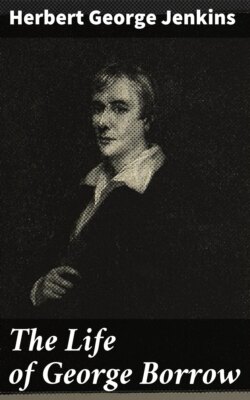Читать книгу The Life of George Borrow - Herbert George Jenkins - Страница 3
PREFACE
ОглавлениеDuring the whole of Borrow’s manhood there was probably only one period when he was unquestionably happy in his work and content with his surroundings. He may almost be said to have concentrated into the seven years (1833–1840) that he was employed by the British and Foreign Bible Society in Russia, Portugal and Spain, a lifetime’s energy and resource. From an unknown hack-writer, who hawked about unsaleable translations of Welsh and Danish bards, a travelling tinker and a vagabond Ulysses, he became a person of considerable importance. His name was acclaimed with praise and enthusiasm at Bible meetings from one end of the country to the other. He developed an astonishing aptitude for affairs, a tireless energy, and a diplomatic resourcefulness that aroused silent wonder in those who had hitherto regarded him as a failure. His illegal imprisonment in Madrid nearly brought about a diplomatic rupture between Great Britain and Spain, and later his missionary work in the Peninsula was referred to by Sir Robert Peel in the House of Commons as an instance of what could be achieved by courage and determination in the face of great difficulties.
Those seven rich and productive years realised to the full the strange talents and unsuspected abilities of George Borrow’s unique character. He himself referred to the period spent in Spain as the “five happiest years” of his life. When, however, his life came to be written by Dr Knapp, than whom no biographer has approved himself more loyal or enthusiastic, it was found that the records of that period were not accessible. The letters that he had addressed to the Bible Society had been mislaid. These came to light shortly after the publication of Dr Knapp’s work, and type-written copies were placed at my disposal by the General Committee long before they were given to the public in volume form.
A systematic search at the Public Record Office has revealed a wealth of unpublished documents, including a lengthy letter from Borrow relating to his imprisonment at Seville in 1839. From other sources much valuable information and many interesting anecdotes have been obtained, and through the courtesy of their possessor a number of unpublished Borrow letters are either printed in their entirety or are quoted from in this volume.
My thanks are due in particular to the Committee of British and Foreign Bible Society for placing at my disposal the copies of the Borrow Letters, and also for permission to reproduce the interesting silhouette of the Rev. Andrew Brandram, and to the Rev. T. H. Darlow, M.A. (Literary Superintendent), whose uniform kindness and desire to assist me I find it impossible adequately to acknowledge. My thanks are also due to the Rt. Hon. Sir Edward Grey, M.P., for permission to examine the despatches from the British Embassy at Madrid at the Record Office, and the Registers of Passports at the Foreign Office, and to Mr F. H. Bowring (son of Sir John Bowring), Mr Wilfrid J. Bowring (who has placed at my disposal a number of letters from Borrow to his grandfather), Mr R. W. Brant, Mr Ernest H. Caddie, Mr William Canton, Mr S. D. Charles, an ardent Borrovian from whom I have received much kindness and many valuable suggestions, Mr A. I. Dasent, the editors of The Athenæum and The Bookman, Mr Thomas Hake, Mr D. B. Hill of Mattishall, Norfolk, Mr James Hooper, Mr W. F. T. Jarrold (for permission to reproduce the hitherto unpublished portrait of Borrow painted by his brother), Dr F. G. Kenyon, C.B., Mr F. A. Mumby, Mr George Porter of Denbigh (for interesting particulars about Borrow’s first visit to Wales), Mr Theodore Rossi, Mr Theodore Watts-Dunton, Mr Thomas Vade-Walpole, who have all responded to my appeal for help with great willingness.
To one friend, who elects to be nameless, I am deeply grateful for many valuable suggestions and much help; but above all for the keen interest he has taken in a work which he first encouraged me to write. To her who gave so plentifully of her leisure in transcribing documents at the Record Office and in research work at the British Museum and elsewhere, I am indebted beyond all possibility of acknowledgment. To no one more than to Mr John Murray are my acknowledgments due for his unfailing kindness, patience and assistance. It is no exaggeration to state that but for his aid and encouragement this book could not have been written.
Herbert Jenkins.
January, 1912.
